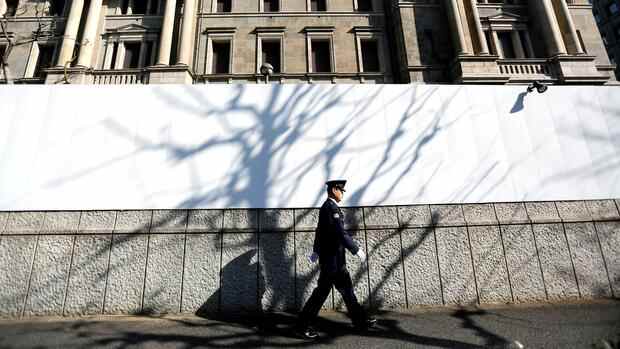The Japanese central bank is sticking to its monetary policy course.
(Photo: Reuters)
Tokyo Despite rising inflation, Japan’s central bank is sticking to its low interest rate policy. The Bank of Japan’s Monetary Policy Committee decided on Friday to keep short-term interest rates at minus 0.1 percent and long-term interest rates at zero. The central bank also confirmed that the central bank can buy unlimited amounts of Japanese government bonds and shares worth up to 12 trillion yen (91 billion euros) per year.
As expected by the markets, Japan’s currency watchdogs are continuing to oppose the global turnaround in interest rates, which central banks are trying to use to stem the galloping inflation. On Wednesday, the US Federal Reserve raised interest rates by 0.25 percent and announced further hikes this year.
The Bank of England followed suit on Thursday, and to the markets’ surprise, Taiwan’s central bank hiked rates for the first time since 2011. “We believe this reflects growing concerns about inflation expectations and a pre-emptive response to upcoming Fed rate hikes,” Bank of America economists Merrill Lynch commented on Taiwan’s move.
Given persistent inflationary pressures, Taiwan economists expect two more hikes of 12.5 basis points each in June and September this year. Because not only in the chip stronghold there is concern that the Asian national currencies could lose value drastically if the interest rate differential to US bonds widens. South Korea’s Finance Minister Hong Nam-ki pledged on Thursday that the government would support the national currency, the won, if it fell excessively against the dollar.
Top jobs of the day
Find the best jobs now and
be notified by email.
The problem: a weaker currency generally increases the competitiveness of a country’s exporters. But in this case, the fear prevails that a weak currency will fuel inflation even further because a country would then have to pay even more for soaring commodity prices.
In Japan, inflation is lagging behind trend
In Japan, too, the pressure on the central bank to slow down the fall of the yen is growing. But the central bank is still refusing to do so as inflation is well behind the global trend. In January, despite rising import costs, the price increase was statistically well below the inflation target of two percent at 0.2 percent.
Instead, the central bank points out that although the economy is continuing to recover, it is once again showing “certain weakness”. According to the Bank of Japan, this is mainly due to the consequences of the corona pandemic. However, the institute continues to focus on the consequences of the Ukraine war, in particular the volatile global financial and capital markets and the “significantly” rising prices for commodities such as crude oil and gas.
Shigeto Nagai, economist at Oxford Economics, believes that the central bank will continue to buck the global trend: “The Bank of Japan has little incentive to push ahead with the normalization of its policy,” said Nagai. Because he doesn’t believe that the side effects of low interest rates are enough to outweigh the positive effects on the economy and the debt service of the heavily indebted country.
The market sees it similarly: the Bank of Japan’s decision caused no reaction on either the stock, foreign exchange or bond markets. The national currency remained at 118 yen to the dollar, its weakest level in five years. But some FX analysts expect the yen could continue to weaken against the dollar.
More: To combat inflation, the Fed raises interest rates by 0.25 percentage points – and announces further steps. It’s the start of a risky mission.
